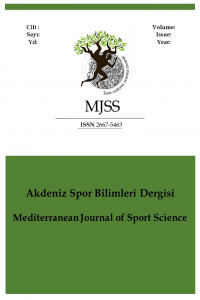Sporda Hedonik Tüketim Tutum Ölçeğinin (SHTÖ) Geliştirilmesi; Geçerlilik ve Güvenirlik Çalışması
: Spor, Hedonik Tüketim, Faydacı Tüketim, Tutum
Development of Hedonic Consumptıon Attıtude Scale in Sports; Validity and Relıability Study
Sports, Hedonic Consumption, Utilitarian Consumption, Attitude,
___
- Arnold, M. J., & Reynolds, K. E. (2003). Hedonic shopping motivations. Journal Of Retailing, 79(2), 77–95. https://doi.org/10.1016/S0022-4359(03)00007-1
- Bati, U. (2018). Consumer behavior. İstanbul: Alfa Publications.
- Buyukozturk, Ş. (2011). Data analysis handbook for social sciences - statistics, research design SPSS applications and interpretation (Extended 13th Edition). Ankara: Pegem Academy.
- Buyukozturk, Ş. (2014). Handbook of Data analysis for social sciences: Statistics, research design, spss applications and commentary (Extended 20th Edition). Ankara: Pegem Academy.
- Celenk, C. (2021). Motivation affects sports and life skills in physical disabled people. Journal of Educational Psychology-Propositos y Representaciones, 9(3). https://doi.org/10.20511/pyr2021.v9nSPE3.1161.
- Ceyhun, S., & Turhan, F. H. (2017). Examination of physical activity and quality of life of volunteer camp leader candidates. Ataturk University Journal of Physical Education and Sport Sciences, 19(4).
- Hinkin, T. R. (1998). A brief tutorial on the development of measures for use in survey questionnaires. Organizational Research Methods, 1(1), 104-121. https://doi.org/10.1177/109442819800100106.
- Kadioglu, Z. K. (2014). Consumption communication: Processes, perceptions and execution. Istanbul: Pales Publishing.
- Kim, S., & Kim, J. (2016). The influence of hedonic versus utilitarian consumption situations on the compromise effect. Mark Lett. 27, 387–401. https://doi.org/10.1007/S11002-014-9331-0.
- Odabasi, Y. (2017). Postmodern marketing. İstanbul: Mediacat.
- Saritas, E., & Hasiloglu, S. B. (2015). An examination of working women's purchases from private shopping sites in terms of hedonic consumption. Journal of Internet Applications and Management, 6(1), 53-62.
- Schumacker, R. E., & Lomax, R. G. (2004). A beginner's guide to structural equation modeling. Psychology Press.
- Tavsancil, E. (2010). Measurement of Attitudes and Data Analysis With Spss. Ankara: Nobel Publishing Distribution.
- Tabachnick, B. G., & Fidell, L. S. (2007). Using Multivariate Statistics (5th ed.). New York: Allynand Bacon.
- Tekin, H. (1996). Measurement And Evaluation İn Education. (9th Edition). Ankara: Yargı Publications.
- Tutar, O. F. (2022). Recreation and Sports, Current Approaches in Psychosocial Fields, Hedonic Consumption in Sports. İksad Publishing House, 149-161.
- www.tdk.gov.tr Date of Access: 30.05.2023.
- Yurtsizoglu, Z. (2020). The hedonic consumption tendency of high school students who are fans of sports teams. Cumhuriyet University Journal of Economics and Administrative Sciences, 21(1), 146-162. https://doi.org/10.37880/cumuiibf.614305
- Yayın Aralığı: Yılda 4 Sayı
- Başlangıç: 2018
- Yayıncı: Hasan ŞAHAN
Üniversite Öğrencilerinin Sağlıklı Olma Kültürü Davranışlarının Araştırılması
Murat Bekleyiş APAYDIN, Mustafa KIZILKOCA
Egzersizin Spor Farkındalığı ve Mental Dayanıklılığa Etkisi
Yunus Emre ÇİNGÖZ, Mehmet SÖYLER
Gönül TEKKURŞUN DEMİR, Halil İbrahim CİCİOĞLU, Yunus Emre YARAYAN
Halk Oyuncuların Serbest Zaman Doyum ve Mutluluk Düzeylerinin İncelenmesi
Profesyonel ve Amatör Güreşçilerin Spor Yaralanması Kaygı Düzeylerinin İncelenmesi
Yasemin ADAR YİĞİT, İsa SAĞIROĞLU, Fuat ERDUĞAN, Ajlan SAÇ
Sporcuların Sosyal Zeka Düzeylerinin Karar Verme Üzerine Etkisi
